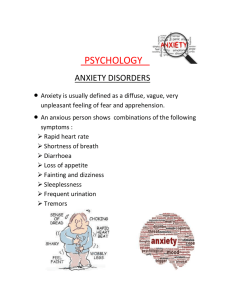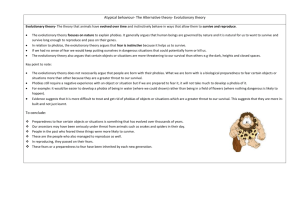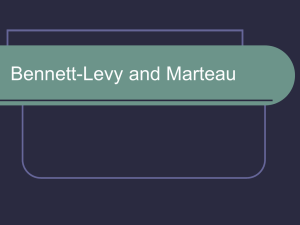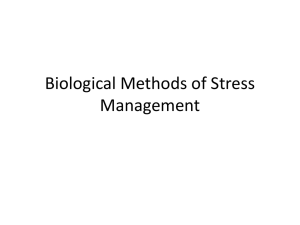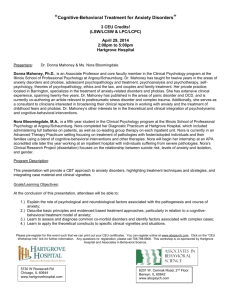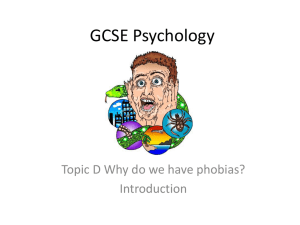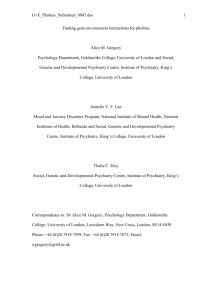here
advertisement
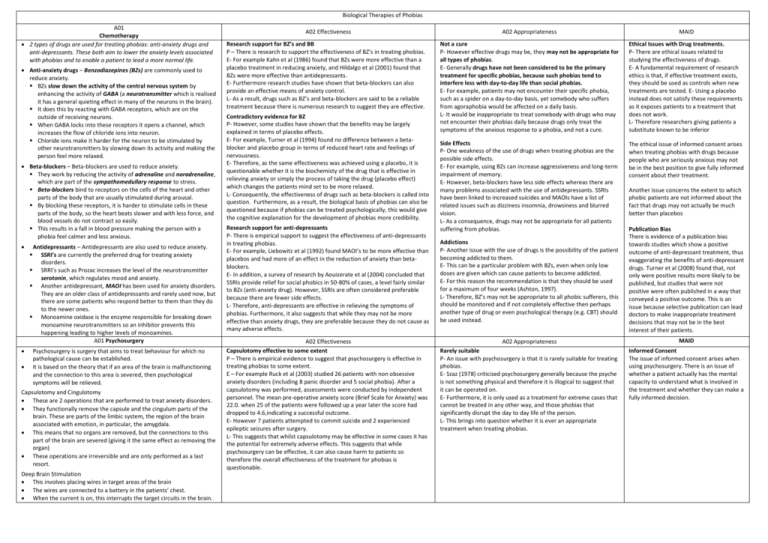
Biological Therapies of Phobias A01 Chemotherapy 2 types of drugs are used for treating phobias: anti-anxiety drugs and anti-depressants. These both aim to lower the anxiety levels associated with phobias and to enable a patient to lead a more normal life. Anti-anxiety drugs – Benzodiazepines (BZs) are commonly used to reduce anxiety. BZs slow down the activity of the central nervous system by enhancing the activity of GABA (a neurotransmitter which is realised it has a general quieting effect in many of the neurons in the brain). It does this by reacting with GABA receptors, which are on the outside of receiving neurons. When GABA locks into these receptors it opens a channel, which increases the flow of chloride ions into neuron. Chloride ions make it harder for the neuron to be stimulated by other neurotransmitters by slowing down its activity and making the person feel more relaxed. Beta-blockers – Beta-blockers are used to reduce anxiety. They work by reducing the activity of adrenaline and noradrenaline, which are part of the sympathomedullary response to stress. Beta-blockers bind to receptors on the cells of the heart and other parts of the body that are usually stimulated during arousal. By blocking these receptors, it is harder to stimulate cells in these parts of the body, so the heart beats slower and with less force, and blood vessels do not contract so easily. This results in a fall in blood pressure making the person with a phobia feel calmer and less anxious. Antidepressants – Antidepressants are also used to reduce anxiety. SSRI’s are currently the preferred drug for treating anxiety disorders. SRRI’s such as Prozac increases the level of the neurotransmitter serotonin, which regulates mood and anxiety. Another antidepressant, MAOI has been used for anxiety disorders. They are an older class of antidepressants and rarely used now, but there are some patients who respond better to them than they do to the newer ones. Monoamine oxidase is the enzyme responsible for breaking down monoamine neurotransmitters so an inhibitor prevents this happening leading to higher levels of monoamines. A01 Psychosurgery Psychosurgery is surgery that aims to treat behaviour for which no pathological cause can be established. It is based on the theory that if an area of the brain is malfunctioning and the connection to this area is severed, then psychological symptoms will be relieved. Capsulotomy and Cingulotomy These are 2 operations that are performed to treat anxiety disorders. They functionally remove the capsule and the cingulum parts of the brain. These are parts of the limbic system, the region of the brain associated with emotion, in particular, the amygdala. This means that no organs are removed, but the connections to this part of the brain are severed (giving it the same effect as removing the organ) These operations are irreversible and are only performed as a last resort. Deep Brain Stimulation This involves placing wires in target areas of the brain The wires are connected to a battery in the patients’ chest. When the current is on, this interrupts the target circuits in the brain. A02 Effectiveness Research support for BZ’s and BB P – There is research to support the effectiveness of BZ’s in treating phobias. E- For example Kahn et al (1986) found that BZs were more effective than a placebo treatment in reducing anxiety, and Hildalgo et al (2001) found that BZs were more effective than antidepressants. E- Furthermore research studies have shown that beta-blockers can also provide an effective means of anxiety control. L- As a result, drugs such as BZ’s and beta-blockers are said to be a reliable treatment because there is numerous research to suggest they are effective. Contradictory evidence for BZ P- However, some studies have shown that the benefits may be largely explained in terms of placebo effects. E- For example, Turner et al (1994) found no difference between a betablocker and placebo group in terms of reduced heart rate and feelings of nervousness. E- Therefore, as the same effectiveness was achieved using a placebo, it is questionable whether it is the biochemisty of the drug that is effective in relieving anxiety or simply the process of taking the drug (placebo effect) which changes the patients mind set to be more relaxed. L- Consequently, the effectiveness of drugs such as beta-blockers is called into question. Furthermore, as a result, the biological basis of phobias can also be questioned because if phobias can be treated psychologically, this would give the cognitive explanation for the development of phobias more credibility. Research support for anti-depressants P- There is empirical support to suggest the effectiveness of anti-depressants in treating phobias. E- For example, Liebowitz et al (1992) found MAOI’s to be more effective than placebos and had more of an effect in the reduction of anxiety than betablockers. E- In addition, a survey of research by Aouizerate et al (2004) concluded that SSRIs provide relief for social phobics in 50-80% of cases, a level fairly similar to BZs (anti-anxiety drug). However, SSRIs are often considered preferable because there are fewer side effects. L- Therefore, anti-depressants are effective in relieving the symptoms of phobias. Furthermore, it also suggests that while they may not be more effective than anxiety drugs, they are preferable because they do not cause as many adverse effects. A02 Effectiveness Capsulotomy effective to some extent P – There is empirical evidence to suggest that psychosurgery is effective in treating phobias to some extent. E – For example Ruck et al (2003) studied 26 patients with non obsessive anxiety disorders (including 8 panic disorder and 5 social phobia). After a capsulotomy was performed, assessments were conducted by independent personnel. The mean pre-operative anxiety score (Brief Scale for Anxiety) was 22.0. when 25 of the patients were followed up a year later the score had dropped to 4.6,indicating a successful outcome. E- However 7 patients attempted to commit suicide and 2 experienced epileptic seizures after surgery. L- This suggests that whilst capsulotomy may be effective in some cases it has the potential for extremely adverse effects. This suggests that while psychosurgery can be effective, it can also cause harm to patients so therefore the overall effectiveness of the treatment for phobias is questionable. A02 Appropriateness MAID Not a cure P- However effective drugs may be, they may not be appropriate for all types of phobias. E- Generally drugs have not been considered to be the primary treatment for specific phobias, because such phobias tend to interfere less with day-to-day life than social phobias. E- For example, patients may not encounter their specific phobia, such as a spider on a day-to-day basis, yet somebody who suffers from agoraphobia would be affected on a daily basis. L- It would be inappropriate to treat somebody with drugs who may not encounter their phobias daily because drugs only treat the symptoms of the anxious response to a phobia, and not a cure. Ethical Issues with Drug treatments. P- There are ethical issues related to studying the effectiveness of drugs. E- A fundamental requirement of research ethics is that, if effective treatment exists, they should be used as controls when new treatments are tested. E- Using a placebo instead does not satisfy these requirements as it exposes patients to a treatment that does not work. L- Therefore researchers giving patients a substitute known to be inferior Side Effects P- One weakness of the use of drugs when treating phobias are the possible side effects. E- For example, using BZs can increase aggressiveness and long-term impairment of memory. E- However, beta-blockers have less side effects whereas there are many problems associated with the use of antidepressants. SSRIs have been linked to increased suicides and MAOIs have a list of related issues such as dizziness insomnia, drowsiness and blurred vision. L- As a consequence, drugs may not be appropriate for all patients suffering from phobias. The ethical issue of informed consent arises when treating phobias with drugs because people who are seriously anxious may not be in the best position to give fully informed consent about their treatment. Addictions P- Another issue with the use of drugs is the possibility of the patient becoming addicted to them. E- This can be a particular problem with BZs, even when only low doses are given which can cause patients to become addicted. E- For this reason the recommendation is that they should be used for a maximum of four weeks (Ashton, 1997). L- Therefore, BZ’s may not be appropriate to all phobic sufferers, this should be monitored and if not completely effective then perhaps another type of drug or even psychological therapy (e.g. CBT) should be used instead. A02 Appropriateness Rarely suitable P- An issue with psychosurgery is that it is rarely suitable for treating phobias. E- Szaz (1978) criticised psychosurgery generally because the psyche is not something physical and therefore it is illogical to suggest that it can be operated on. E- Furthermore, it is only used as a treatment for extreme cases that cannot be treated in any other way, and those phobias that significantly disrupt the day to day life of the person. L- This brings into question whether it is ever an appropriate treatment when treating phobias. Another issue concerns the extent to which phobic patients are not informed about the fact that drugs may not actually be much better than placebos Publication Bias There is evidence of a publication bias towards studies which show a positive outcome of anti-depressant treatment, thus exaggerating the benefits of anti-depressant drugs. Turner et al (2008) found that, not only were positive results more likely to be published, but studies that were not positive were often published in a way that conveyed a positive outcome. This is an issue because selective publication can lead doctors to make inappropriate treatment decisions that may not be in the best interest of their patients. MAID Informed Consent The issue of informed consent arises when using psychosurgery. There is an issue of whether a patient actually has the mental capacity to understand what is involved in the treatment and whether they can make a fully informed decision.
